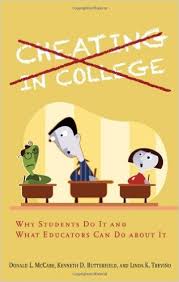An Ethical Systems Book Review
BY JARED WOLF
Cheating in College: Why Students Do It and What Educators Can Do About It
by: Donald L. McCabe, Kenneth D. Butterfield, and Linda K. Treviño
John Hopkins University Press (2012) Public Library
Summarized by Jared Wolf

From one-room elementary schoolhouses to several hundred-person college lecture halls, students have sought loopholes and shortcuts as long as there have been buildings in which to teach them. The system that reinforces these pervasive incidents and opportunities for dishonesty is brought to bear in the new book Cheating in College: Why Students Do It and What Educators Can Do About It, by Donald L. McCabe, Kenneth D. Butterfield, and Linda K. Treviño (the latter an Ethical Systems collaborator).
Building on twenty years of previous study, the authors analyzed major research and outline why academic trendspotters tend to be pessimistic about the presence of incorruptibility in academia…and understandably so.
Cheating happens so long as there are tests, be they admissions or academic in nature. The real start of research on student cheating is considered to be the work of William J. Bowers, who conducted the first “large-scale, multi-campus study of student academic dishonesty” in the early 1960s (Student Dishonesty and Its Control in College). Since Bill Bowers’ initial wave of research about ethical dilemmas in the classroom, no “magic elixirs or shortcuts to achieving success” on this topic have been presented.
A study conducted in 1993 at nine large public universities identified a then recent upswing in incidents, citing “significant increases in the rate of self-reported cheating on tests and exams.” These findings are emphasized by additional cheating scandals in the past twenty years. In 2005, “119 prospective Harvard MBA students’ applications were rejected because the applicants allegedly hacked into the school’s admissions website.” In 2001, at the University of Virginia, “a school with a long-standing honor code traditions, a physics professor found evidence of plagiarism in as many as 60 papers submitted by students.”
Despite the pervasiveness of dishonesty, McCabe, Butterfield, and Treviño remain hopeful in regards to the large-scale restoration of academic integrity. Cheating in College strives for sounder policies and better execution by faculty and administrators in higher education.
The result is lifelong. Channeling the right behavior during a students’ time in higher education lays the groundwork for more successful futures. Researchers found that many students’ attitudes change while at college, and “these attitudes tend to persist later in life.”
ATTITUDES AND OUTLOOKS SHAPED BY CULTURE
College years are crucial in developing a sound moral compass for years beyond our schooling, yet many students disengage themselves from ethical boundaries. A rising junior at the University of Miami gave his thoughts on students’ work ethic at school: “For a lot of people, college is about getting the best grades possible while doing the least amount of work. The general mindset is that only when we embark on our postgraduate endeavors, integrity starts to matter. The skills we acquire at work will be far more significant than the skills we acquire at the undergraduate level.”
High grades are prioritized for many students, as they see the correlation between high GPA and better job opportunities. However, majors and networking also have a significant impact on their success in the industry they wish to pursue. As exemplified, this result-oriented notion may lead students to be more interested in “making the grade” than in what they are actually learning. Students cling to expectations of an honest career, yet do not consider the consequences of breaching academic trust. Yet, not all students cheat. In fact, most do not. But how can administrators and businesses predicate their judgment and promote trustworthy environments?
It is necessary to uncover areas both when and where dishonest behavior is most prevalent, both on and off campus.
Establishing a culture of integrity is important to form the expectations by which we expect students to live. If educators more regularly encourage ethical behavior and demonstrate the irregularity of cheating, research shows that members of these organizations will be less inclined to cheat.
Achieving a well-grounded culture of integrity requires regular sustainment and oversight, and the approval of the student body is essential. Students are being taught (indirectly) that cheating is acceptable. It has become an unwanted but integral part of the American education system, although America does not stand alone on this issue. Cheating has become axiomatic. As a component of academic culture, cheating stands without speaking.
Pre-orientation, and at every point thereafter, colleges should emphasize their culture of integrity. It is crucial to stress the importance of displaying honest behavior before classes start. Younger students tend to cheat more than older ones, perhaps because “first-year students and sophomores often find themselves in larger lecture courses that are outside their primary interest area”, but also because first-year students are the most likely to follow the pack and they feel more pressure to keep up and perform. For others, cheating is caused more by a lack of interest and fear of disapproval than by peer behavior.
ALTERNATIVES TO HONOR CODES
Many campus cultures are based on honor codes. While these exist, there is less proof that they work to mitigate the problem of cheating.
Researchers measured the efficacy of honor codes at universities nationwide, concluding that “academic dishonesty is significantly lower in honor code environments,” however, “the difficulty of determining the effectiveness of honor codes is that not all codes are equal, nor do they produce the same results.”
Peer influence has a noticeable effect on the behavior of students, and its power cannot be understated. Peer influence “exhibits a stronger relationship with academic integrity than does the presence or absence of an honor code.” McCabe, Butterfield, and Treviño added by stating that “[peer influence] derives from the psychological tendency to behave in accordance with the values of the people whom you surround yourself with.”
Areas like Greek life and sports may provide more opportunities for negative and positive peer influence. The authors cited membership in fraternities and sororities and participation in intercollegiate athletics, “with research consistently showing that students in these activities are more likely to cheat.” Students involved in Greek life have access to hundreds of pages of test banks and an immediate network of students for collaboration. This can be problematic for maintaining integrity at a large university, as “it can provide access to people and resources (e.g., test files) that facilitate cheating and may represent an environment where norms, values, and skills associated with cheating are more easily transmitted (e.g., Stannard and Bowers 1970).”
THE ROLE OF EDUCATORS
Yet, despite the presence of external factors, educational peers maintain a more outsized role in influencing cheating and dishonesty. The authors believe the more college educators are noticeably engaged in combating breaches of academic integrity, the more students will feel inclined to act responsibly. Research supports this theory– as studies show that when you highlight the positive, it can provide more benefit than just focusing on the negative.
Looking at it more systemically, educators design courses, and their methods have an immediate effect on the way students’ cope with their workload. Even within the same university, students can have completely different experiences in two of the same courses taught by two different professors. At institutions where academic integrity is of greater concern, a change in curriculum should be considered.
Educators must also be willing to be exemplary leaders through their actions. A study on cheating and honesty featured on Ethical Systems shows how leaders in any field must be willing to “walk the talk” if they want to undergo real change in their organization. The research suggests “creating honest cultures can reduce ethical failures by strengthening norms of appropriate conduct rather than strengthening rules.” Additionally, researchers, as we have discussed, found that “most people cheat under some circumstances.” The average person’s moral compass is adaptable to different situations. Ethical behavior can be achieved by “changing those circumstances, rather than (or in addition to) trying to change the people.”
Research by Ethical Systems collaborator Adam Grant highlights the importance of rewarding ethical behavior as a means of discouraging unethical behavior. Based on their data, developing “incentive and promotion systems” can have a positive effect on workplace behavior. In addition, they urge employers to “leverage internal communications.” Through their research, they found that publicizing data about unethical behavior and its scarcity can encourage employees to want to be an inclusive, ethical contributor to a company’s environment.
Although this research is focused on business organizations, the same tactic can be applied to students across the college spectrum.
REFORMING THE SYSTEM
The academic system in America may want to consider adopting tactics from other nations to combat dishonesty. However, this will require a wholesale rethinking in how we present and provide information to students.
American educators are known for emphasizing timely assessments (exams) and essays as an accurate measurement for how well a student comprehends the material that is being taught. These teaching principles can have a positive effect on learning material, but students often find ways to evade a heavy workload. In contrast, educators in Western Europe value participation in lectures and continued progress in comprehension of course material over memorization and recitation.
If educators value open discussions, and design grading systems based on displayed intuition, increased effort, and noticeable progression throughout the course, then students will be more inclined to display academic integrity. Students would have an easier time discovering what subjects interest them most, allowing for both intellectual and personal growths.
Too much of college has become result oriented. Researchers urge organizations and institutions to “cultivate a growth mindset” so that employees and students can see progress, focusing on peoples “efforts, improvements, and learning, rather than their talents, gifts, and outcomes. Growth mindsets lead to better performance and less cheating.”
Students in America are mechanized to put success above integrity. Engrained are idioms such as “nice guys finish last”, “these are the years to have fun” and “do whatever it takes to get the job done,” which influence students to take the shortest, easiest route without serious regard for a moral code. In contrast, the majority of individuals who seek to display integrity in their academic endeavors begin to feel shorted as they watch their peers get ahead. Resultantly, some students join the march by the time they leave college. Unethical acts in the academic world occur way more than they should and certainly more than anyone might wish to recognize.
It is important that students strive to be better learners so they can be well equipped for a better, brighter future, but investing oneself in a strong value system is equally important. We need to push for positive change and display continued integrity in our education system, as today’s college students become the world leaders of tomorrow.
Unethical acts in the business world also occur way more than they should, and the underlying cause and effect might not be much different from the academic world. Big businesses certainly need to display more honest behavior. Yet, problems concerning ethics are becoming increasingly complex as our world becomes more interconnected.
Until we are unable to discontinue acts of cheating for our youth in academia, how can we hold ourselves accountable for handling ethics in the workplace? Today’s students will soon be running our world; we must concern ourselves with encouraging ethical practices as based on strong foundations.
This collection of references and resources was created by Ethical Systems at the NYU Stern School of Business. This content is used by permission of Ethical Systems.



Recent Comments